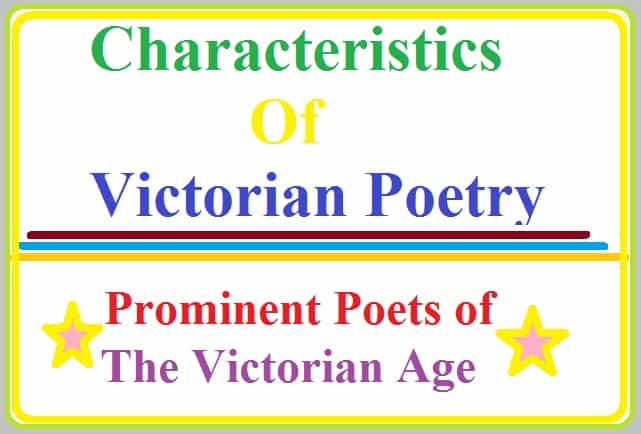Welcome to my another blog post. Today I am going to describe about the Characteristics of Victorian Poetry with the reference to the prominent poets of the Victorian Age or Era.
Table of Contents
When was the Victorian Era
The Victorian Era or Period literally describes the events in the Age of Queen Victoria’s reign. This age provided a significant development of poetic ideals such as the increased of the sonnet as a poetic form which was to influence later modern poets.
Poets of Victorian Era or Period
Poets in Victorian Period were to some extent influenced by the Romantic Poets such as Keats, William Blake, Shelly and Wordsworth. Wordsworth was succeeded by Lord Tennyson, Queen Victoria’s favorite poet.
Wordsworth was Poet Laureate until 1850 so can be viewed as a bridge between the Romantic Period and Victorian Period in history of poetry, providing the link between the Romantic Movement and the Modernist Movement of the 20th Century. The husband and wife poetry team of Elizabeth Barrett Browning and Robert Browning conducted their love affair through Verse and produced many tender and passionate poems.

Features or Characteristics of Victorian Poetry
1. The Victorian poetry reflects the complex tendencies of the Victorian Age-Social, Political and religious.
2. Adventure to the sea is one of the main features of Victorian Poetry. Tennyson’s “Ulysses’, “Break, Break, Break” are the example of sea adventure.
3. Criticism of war are the special features of Victorian poetry. Hardy’s poems are remarkable for criticism of war. His poem “In time of the breaking nation” in where he shows the hollowness of war and criticizes.
4. Vigor and musical quality are one of the main feature of Victorian poetry. Kipling’s “Recessional” and “Danny Deever”, Browning’s “My Last Duchess” and Elizabeth Barrett Browning’s “How do I love Thee” etc. are the example of this regard.
Major Poets of Victorian Age
The major poets who contribute profusely in Victorian Poetry, they are Alfred Loard Tennyson, Robert Browning and his wife, Mathew Arnold, Rudyard Kipling etc.
Alfred Lord Tennyson As a Victorian Poet
Tennyson was born in 1809, who was the symbolic of Victorian’s desire and hope. He was the member of the House of Lords. He had a keen artistic perception for beauties in nature. His poetry is the philosophy of faith and hope. Tennyson is a representative poet of the melody, wisdom, passion and harmony. He was always in touch with the national feeling, political movements and scientific research of his time. He gives expression of the Scientific Sprit of the age.
There is something universal in his poetry that has an appeal to all modern. His earlier poems, the new volumes include “Locksley Hall”, “Ulysses”, “Morte d’Arthur” and “Break, Break, Break”. The last named poem was Tennyson’s first poetic expression of grief at Hallam’s death. “Locksley Hall” was a spirited young’s man attack on a society which placed rank and many above character. In 1850 Tennyson published “In Memorian” a series of elegies in which he paid tribute to Hallam and also reveled his own search for meaning in life. In his poem “Ulysses” he says in the following ways:
“I can not rest from travel: I will drink
Life to the lees”
“Crossing Bar” is his last poem.
Robert Browning As a Victorian Poet
Robert Browning like Chaucer was interested in people all kinds of people the ignoble as well as the noble. Like Chaucer too he was not looking for obstruct truth but sought to depict the whole of life. The individual not society was important to Browning. He was the psychologist of the emotions.
Browning was basically optimistic and his poem reflect the qualities he admire, joy in life, faith in the inherent, goodness of universe and courage. “Pippa” a little factory worker passes through town on here one holiday of the year, singing happily to herself. Browning published “Bramatic Lyrics” which included what has become one of his famous dramatic monologues, “My Last Duchess”. In this poem the poet tells about the duke order in the following ways:
“These grew I gave command
Then all the smiles stopped together”
Like so many poems of Browning, it has an Italian Renaissance setting. The dramatic monologue is a from Browning brought to perfection. “A Woman’s Last Word”, “The Last Ride Together”, “Andrea Del Sarto”,
“Fra Lippo Lippi” and “Pictor Ignotus” are some of the outstanding dramatic monologues dealing with problems of life and conscience.
Mathew Arnold As a Victorian Poet
Mathew Arnold was poet and critic. For ten years he was a professor of poetry at Oxford. He belonged to the group of the reflective, thoughtful and intellectual poets of the Victorian Age. The poet of Mathew Arnold can broadly be classified into narrative, dramatic, elegiac and lyrical poems, besides a few sonnets which he wrote time to time. Mather Arnold’s poetry is a criticism of life. His poetry lacks spontaneity, unaffected, passion, rapture and qualities by which great poetry is judged. His poetry is rich in philosophical mood, stoicism and seriousness. He, in fact, is the poet of the intellectuals and thoughtful person.
According to Mathew Arnold, the role of the poet is not only to add to the knowledge of man but also to add to their happiness. He say that “Poetry is at foundation a criticism of life, the greatness of a poet lies in his powerful and beautiful application of ideas to life. “The Scholar Gypsy” he excels in the description of typical English scenery. The poem has classical stateliness and formal type of beauty. His meditative poems “Dover Beach” and “A Summer Night” have melancholic note and the cause of his pessimism is the erosion of values during the Victorian Age. “Tyrisis” and “Rugby Chapel” are his another famous poem.
Elizabeth Barrett Browning
How do I love thee? Let me count the ways.
For your better understanding about the characteristic of Victorian Poetry you may watch the following video:
Read More Valuable Literary Writings in the following:
Treatment of history and myth in Yeats’ poetry.
Dover Beach Poem Analysis | Critical appreciation or theme on the poem “Dover Beach”
To His Coy Mistress Analysis And Summary By Andrew Marvell
Theme of melancholy in Emily Dickenson poems analysis
Ode to a skylark critical appreciation or analysis theme summary
John Donne poems reflects love – John Donne as a metaphysical poet research paper
Melodramatic elements in Seneca’s Phaedra By Seneca
Song of Myself by Walt Whitman , Main Theme, Summary, Analysis
Character of Belinda in The Rape of The Lock By Alexander Pope


